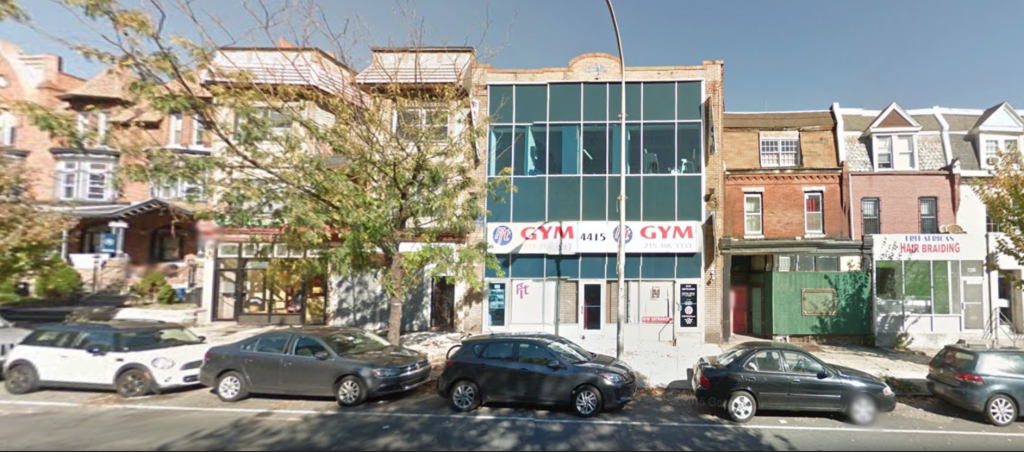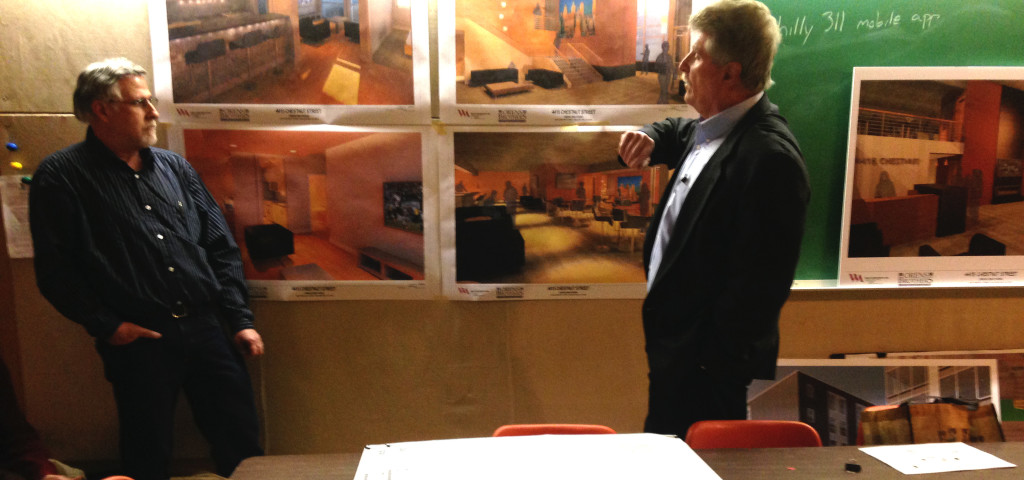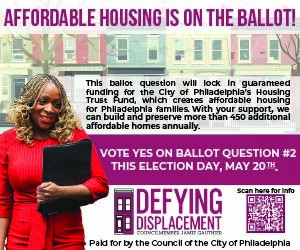
The portion of the 4400 block of Chestnut that would be the front of a new apartment complex on the 4400 block of Chestnut. The two buildings to the right of the gym would be demolished to make room. (Photo from Google Streetview)
West Philly-based property developers Orens Brothers presented a more detailed plan for a high-end, 150-unit complex on the 4400 block of Chestnut Street to the Spruce Hill Community Association zoning committee last night.
Orens Brothers, whose headquarters are in the current glass-fronted building at 4415 Chestnut, have been acquiring mostly vacant properties on that block, on 44th Street and Ludlow Street that they will demolish to make room for a planned five-story glass and brick building on Chestnut that would extend north to Ludlow and east to 44th (behind businesses near 44th and Chestnut). That building would connect via a covered walkway to another new building on the 4400 block of Ludlow.
Yep, it’s complicated. The complex would house 150 mostly two-bedroom, market-rate apartments. Fit Gym, which is located in the current building (and is also owned by the Orens Brothers) would be moved to the first floor of the Ludlow Street building. The plan also includes 1,500 square feet of commercial space along Chestnut Street that could accommodate a small café or deli. The proposal includes 65 off-street parking spots on the property.

Scott (right) and Guy Orens present plans for the project to the Spruce Hill Community Association zoning committee last night. (Photo by West Philly Local)
The Orens Brothers, who have developed several properties in West Philly including the Croydon building, offered some very preliminary ideas to the committee last month. This time was more formal and a dozen or so nearby residents were on hand to ask questions about parking, property taxes and time frames.
“It’s gentrification at its best,” said Darryl Thomas, the owner of Philly Cuts at 4409 Chestnut, who said he is not against the project but has many questions.
While the project will likely bring more activity to an area that includes a lot vacant lots and deteriorating properties, he and other wonder what impact it will have on the small businesses and single-family homes that are left standing nearby.
The project would be built on a patchwork of parcels and many will need variances for the project to go ahead. Nothing official was decided at last night’s meeting. There will be at least one more meeting with the zoning committee before the project goes before the city’s Zoning Board of Adjustments.








April 24th, 2015 at 9:49 am
Maybe the city ought to consider changing the property tax abatement rules to require projects over a certain number of units, say 4, provide a percentage of units affordable to low income residents in order to qualify for the abatement. 44th and Chestnut is a natural location for dense housing given its proximity to the el, but dense housing should serve all the neighborhoods’ residents, not just those affiliated with the universities.
At least it’s outside the PAS catchment, to avoid the inevitable headaches that would otherwise cause.
April 24th, 2015 at 10:44 am
I have spoken with a few residents and business owners this morning. They do not approve the plans thus far. There were legitimate questions asked last night that got eye roll responses and aggression through mockery.
I have seen the plan for this building ALL GLASS!! that raises the temperature of the neighborhood and affects bird migration.
The Mill Creek runs under this… Will they divert the water to the houses in existence? How will they deal with this water way?
What about the existing properties affected by building will they shore up those houses?
Closing down chestnut and ludlow for 18 months plus fro construction will congest other streets.
Has an impact study been done?
When asked about the insurance underwriter Oren Brothers avoided the question.
Since this pushes against the 45th street catchment I believe Walnut Hill Community should have also been informed.
Some of the concerns brought to my attention today were
Putting an end to the 10 year abatement all together for apartment complexes.
The 1% for art should remain in the neighborhood NOT got to mural arts or PFAF
We need to put a hold on the AVI for long time residents.
This type of build will continue to push the long standing elderly out of the neighborhood.
The building is a modern glass piece that destroys the victorian look of the street.
There will be a public meeting to discuss this further
April 24th, 2015 at 11:24 am
“raises the temperature of the neighborhood.” Awesome.
More seriously, I hope the Orens take the 43rd and Baltimore community engagement process as a model. I know it’s still preliminary, but this is indeed a huge project that is going to re-shape this part of the neighborhood, and there needs to be a more structured process for community input than just presentations and (inevitably chaotic) public meetings.
And maybe it should be like when you make an offer an a house you have to be pre-approved, only in this case, prove that they’ve made the necessary arrangements with Councilwoman Blackwell.
April 24th, 2015 at 11:54 am
OK the glass raising temperatures in the neighborhood comment is not reasonable (from an engineering/science sense, I mean), but the need for transparency (!) with the neighbors about their concerns is still valid.
I would want to know what the hydrology issues are around there and what kinds of impacts to road closures the project would create.
I’m less concerned about the ‘destruction of Victorian aesthetic’ argument, since that area already features a variety of architectural modes.
Finally, I appreciate concerns about rising land values, but this is an opportunity to eliminate some serious blight, which is not benefiting existing homeowners either.
April 24th, 2015 at 3:55 pm
I’m going off of recent publications on Glass structures. Here’s a nice piece http://www2.buildinggreen.com/blogs/its-time-rethink-all-glass-building
for the birds? http://www.nycaudubon.org/project-safe-flight
Development Leads to Stream Degradation
As in other parts of the city, rapid urbanization led to the degradation of stream quality in several ways. Several Cobbs Creek tributaries within Philadelphia were encapsulated in combined sewers, the largest being Thomas Run. Also known as Ameaseka Creek, this stream had its source near 53rd and Walnut streets and flowed into Cobbs Creek at about 60th Street. Thousands of feet of Naylor’s Run in Upper Darby Township were channeled into underground culverts to facilitate commercial and residential development in the filled land above the pipes. A massive increase in impervious surfaces in the watershed meant that runoff reached the creek more quickly, leading to higher storm flows, and increased erosion and scouring of the stream banks and bed. Sewers from the new neighborhoods in the watershed emptied directly into the creek and its tributaries, polluting the water with raw sewage. By 1914, Philadelphia had constructed an interceptor sewer that captured wastes and prevented them from entering the creek, but it took decades longer before communities in neighboring Delaware and Montgomery counties did the same. In more recent times, combined sewer overflows, polluted stormwater runoff and inadequate drainage systems, leaking and inadequate septic tanks, lack of open space for recreation, illegal dumping, and an array of other urban ills have also taken their toll on the quality of human and natural life in the watershed.
April 24th, 2015 at 3:56 pm
If we want to rid blight grab a hammer and some nails set up a time and we as a community can go out and assist the beautification
April 24th, 2015 at 8:38 pm
So, just to be clear, the the article you provide a link to is not concerned with the issue of raising “the temperature of the neighborhood” but that glass buildings require more energy to heat and cool. And with regards to the birds, a five story building of glass( and brick! They are not proposing an entirely glass building) replacing several brick and one glass building, will have next to no net impact on birds.
And, finally, your quote regarding development is describing when west philly was urbanized a hundred years ago, when natural land was replaced by development, and the watershed was indeed ruined. That happened a century ago, however; replacing the current buildings with new buildings will not change that, except insofar as the city is encouraging many new developments to handle rainwater better than older buildings do, it might actually be better.
And while we are at it, if they can manage to build a major skyscraper at 38th and Chestnut while still maintaining three lanes of traffic, I’m pretty sure they will not “shut down” Chestnut for the duration.
I’m a near neighbor, so I’m absolutely in favor of a rigorous and public planning process for this. I don’t want my neighborhood to be overtaken by undergrads anymore than you probably do. I think starting to think in terms of a proportion of units being set aside for low-income is probably wise given how the neighborhood is changing.
But maybe let’s leave the neighborhood temperature out of it.
April 24th, 2015 at 10:34 pm
I am one Director on the Friends of Clark Board. We thought long & hard before we endorsed this bldg.
@sammon: 8-story urban bldgs with glass faces do not affect migratory birds. And the Mill Ck watershed should not cause subsidence at this particular location.
@GX: It’s time for University City lovers to aggressively promote upscale developments. The alternative is to let the market take its course – which amounts to throwing up crappy, bottom-dollar residences for short-term immigrants.